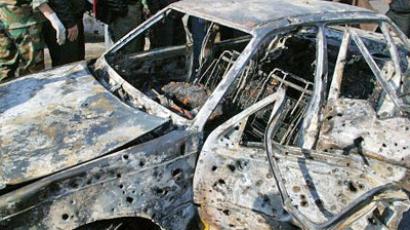‘Syrian verdict will be pre-ordained’
The Syrian government has released 755 detainees as Arab League monitors continue their mission to stop nine months of violence that has killed thousands. However, doubts remain on both sides that the observers can provide a neutral verdict.
The release of the detainees Wednesday follows the three-pronged Arab League plan that will see Damascus withdrawal government troops from residential areas, release prisoners and begin talks with the opposition.The report comes as Sudanese General Mustafa Dabi, the head of the Arab League mission, said he saw “nothing frightening” in the city of Homs, the epicenter of the nine-months of the anti-government rising and the first stop on the month-long monitoring mission that kicked off Tuesday, Reuters reports."There were some places where the situation was not good," Dabi told Reuters by telephone on Wednesday. "But there wasn't anything frightening, at least while we were there. Things were calm and there were no clashes."Meanwhile, some members of the opposition believe the Arab League will prove ineffective by concluding that the violence is being generated from both sides. The opposition also says Dabi’s military background disqualifies him from being a neutral witness, while the Arab League’s mission is nothing more than a stalling tactic to put off a foreign military intervention. However, political analyst James Corbett told RT that while the observer mission is in fact lacking in credibility, it is only because conclusions will unlikely be based on facts on the ground.“The final report will be a pre-ordained conclusion that the Assad government is not doing enough to listen to the concerns of its citizens. Personally, I’m not sure what is more ridiculous about this story – the idea that the autocratic thugs of the Arab League are going to presume to pronounce on the democratic leanings of the Syrian government, or that the international community is supposed to take what they say with any sort of moral authority." “Clearly, these are not people in a position to be lecturing on this. I think that the report has been pre-ordained, and I’d be very surprised to see that it concludes anything other than the fact that the Assad government is to blame for what’s going on in Syria right now,” Corbett said.While he argues that the monitoring mission could potentially be effective, he fears efforts to put off a potentially catastrophic war will likely be disregarded.“It [the monitoring mission] could actually avert military intervention if they do come out and say that the tensions are internal and need to be dealt with internally, but I don’t think that is what is ultimately going to be concluded, but we certainly have to hope that that is the case, because as we know, military intervention in Syria would be an extremely destabilizing event in the region, and would lead almost inevitably to some sort of confrontation with Iran, if not eventually with other states in the region. So I think it is absolutely imperative that this mission does indeed defuse the situation, though I’m not hopeful for that possibility.”While Corbett argues the international community’s decision to dictate how Syria should manage their internal affairs is as ludicrous as Damascus telling the Obama administration how to deal with the Occupy Wall Street protests, he fear that the observer mission will ultimately serve as the first step to justifying outside military intervention in the country.“This is all just political theater that is being played out for the benefit of the public that is obviously unwilling to go along with military intervention unless there is the degree of some sort of body that’s seen to – or at least we’re told – have some sort of moral authority to pronounce on the subject,” he added.
On the other side of the argument, Fergus Hodgson, policy advisor with US-based The Future of Freedom Foundation, told RT that the Arab League mission is in a better position to assess the situation in Syria than any other international players.
He pointed out that given the large number of Arab League observers the mission can provide a greater deal of transparency. “How can you conceal anything from 500 people over a four-month period of time?” he asks.
Hodgson also argues that the Syrian regime realizes that it is under great pressure from the international community and faces possible intervention. “Whenever the Syrian government takes action to constrain or hide things from that group, they will undermine the very effort and make themselves look foolish,” he said. “So it is in their interests to make this Arab League investigation transparent and with a clear outcome as well.”
‘Syrian crisis has reached boiling point’
Author and Middle East expert Tariq Ali says it is difficult to turn a blind eye to the armed opposition extremists operating in Syria, though this is what some foreign nations are managing to do. “Most of the nations which seem reluctant to notice it are the ones supplying the weaponry and arming people,” Tariq Ali told RT from London. “The Qataris and the Saudis have been very active here, so has Turkey. The big question is whether they can push the US to organize an intervention in Syria. Here you have, ironically, pressure by the Israelis on the US, saying they do not particularly want change in Syria.”The situation in Syria remains complex, with many parties involved, and it has reached “a crisis point,” he adds.“You have the regime, which promises reform, delivers nothing and carries on with the repression. You have outside forces backed by Turkey and other countries, who are arming rebels and trying to make it into a total civil war,” he said. “Then you have the opposition, which wants to have a national patriotic struggle to get rid of Assad. It is a situation which remains confused, but which cannot carry on like this indefinitely.”














